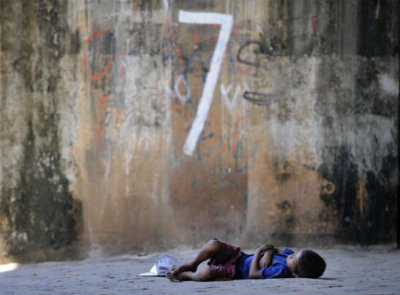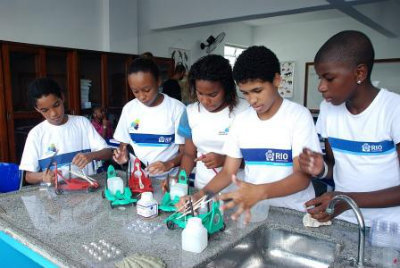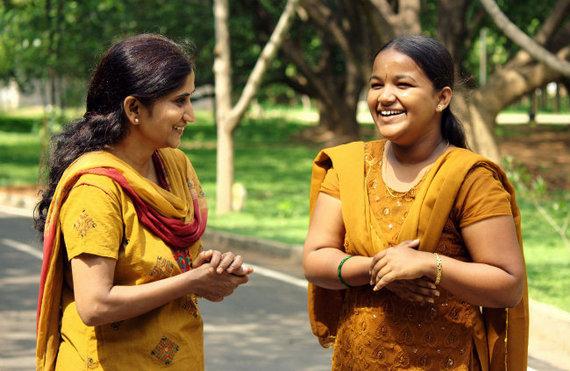A pressing question for many cities is how to create the right educational, social, and economic opportunities for young people so that they gain the tools to build strong foundations for adulthood. The following examples from Jakarta, Lagos, Rio de Janeiro, and Bangalore demonstrate how a caring mentor, a specialized school, or a skills training program can empower youth to transform their lives. Read on to find out more and then visit URB.im to share your thoughts.
 In Jakarta, the street child phenomenon is a real epidemic. In response, the government has created the Child Social Welfare Program, which works in collaboration with community-based organizations to provide street children with shelter and various life skills that enable them to survive and to eventually leave street life. Support for street children also comes through Corporate Social Responsibility initiatives. For example, mobile phone company Telkomsel dispatches technicians to lead technical training for youth and help them build self-confidence and a sense of independence. After the training, participants have the opportunity to intern at a number of Telkomsel outlets to practice their new skills.
In Jakarta, the street child phenomenon is a real epidemic. In response, the government has created the Child Social Welfare Program, which works in collaboration with community-based organizations to provide street children with shelter and various life skills that enable them to survive and to eventually leave street life. Support for street children also comes through Corporate Social Responsibility initiatives. For example, mobile phone company Telkomsel dispatches technicians to lead technical training for youth and help them build self-confidence and a sense of independence. After the training, participants have the opportunity to intern at a number of Telkomsel outlets to practice their new skills.
Youth development initiatives led by the government and civil society organizations also play a crucial role in reducing youth unemployment in Lagos. The Youth Empowerment and ICT Foundation gives young people the opportunity to improve professional skills and employment potential through workshops, seminars, and conferences on information and communication technology. The foundation also runs the Urban Youth Empowerment Program, which targets unemployed 18 to 24-year-olds who are considered high-risk, and supports their transitions to stable careers with services like counseling, occupational skills training, and job placement. The Lagos state government's Ministry of Youth, Sports, and Social Development also makes continuous efforts to engage young people and to generate employment through school-based initiatives that foster entrepreneurship.

In Rio de Janeiro, the city government's Schools of Tomorrow program is helping youth from low-income and violent neighborhoods stay in school and improve academically. This ambitious initiative currently impacts more than 155 schools, with 6,000 active teachers, and 105,000 students. And the results are no less impressive: between 2008 and 2011, dropout rates at Schools of Tomorrow went down by 37 percent, compared to 11 percent in regular public schools. The key to the Schools of Tomorrow initiative has been its comprehensive approach. Beyond basic education, the schools aim to offer students the opportunity to build civic values, play sports, learn from cultural activities, and develop a healthy alternative lifestyle beyond the violence they see in their local communities.
 India's landmark Right to Education Act demonstrates the country's increasing investment in free education for all, as evidenced by a noticeable rise in primary school enrollment. But for at-risk youth who choose to forego secondary school, their future prospects rarely stretch beyond the paths taken by their parents and other members of their local communities. In Bangalore, an organization called Mentor Together is working to expand these options. By carefully matching mentees with experienced mentors, the program helps young people from disadvantaged backgrounds gain a better understanding of their potential, how they should choose a career, and what can make them stand out to employers. Mentor Together shows that education alone is not the cure-all for changing the lives of disadvantaged youth. Rather, young people also need to learn how they can translate their education into opportunities beyond their own neighborhoods.
India's landmark Right to Education Act demonstrates the country's increasing investment in free education for all, as evidenced by a noticeable rise in primary school enrollment. But for at-risk youth who choose to forego secondary school, their future prospects rarely stretch beyond the paths taken by their parents and other members of their local communities. In Bangalore, an organization called Mentor Together is working to expand these options. By carefully matching mentees with experienced mentors, the program helps young people from disadvantaged backgrounds gain a better understanding of their potential, how they should choose a career, and what can make them stand out to employers. Mentor Together shows that education alone is not the cure-all for changing the lives of disadvantaged youth. Rather, young people also need to learn how they can translate their education into opportunities beyond their own neighborhoods.
Adolescents and youth represent great potential for cities, as governments and the private sector are acknowledging through their investments for youth empowerment. Visit URB.im to learn more about initiatives for youth and to join the discussion.
Photo credits: Arifin Syaputra, Secretaria Municipal de Educação de Rio de Janeiro, Mentor Together